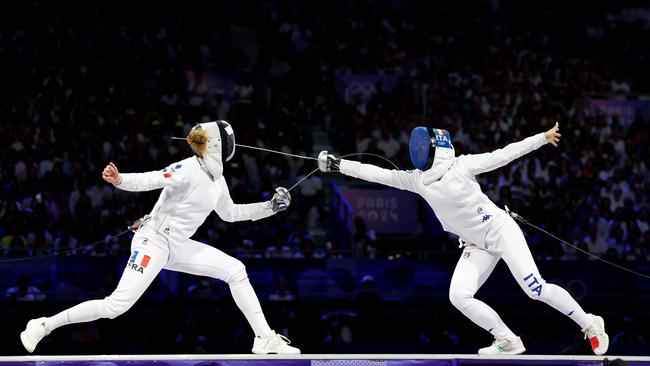Inside the mad and murky world of Olympic fencing
This could be the dirtiest sport at the Olympics. The fencing program is being played out against a backdrop of allegations of bout-fixing and corrupt officials.

As fencers sweep down the ornate staircase at the Grand Palais, it is easy to be seduced by the romance of French swordplay. These combatants might be emerging from the pages of an Alexandre Dumas novel and descending into the city where the artist Edouard Manet once fought a three-day duel after a bad review. It ended with a wounded nipple. Honour offended and then defended, tit for tat, duelling and then fencing became part of the national psyche. And yet this could also be the dirtiest sport at the Olympic Games.
The Grand Palais is a beautiful setting, but the fencing program is being played out against a backdrop of allegations of bout-fixing and corrupt officials.
For years a Russian, Alisher Usmanov, was the most powerful man in the sport as president of the International Fencing Federation (FIE) and although he has now stepped down, many of his appointments hold positions of influence.

Usmanov, one of the world’s wealthiest men, had his assets frozen after the invasion of Ukraine and left as the FIE president complaining that defamatory statements had been made that damaged his honour. And it is honour that has always been at the heart of the traditional view of duelling and fencing.
The Russian invasion of 2022 also affected last year’s World Championships, where a Ukrainian sabre fencer, Olga Kharlan, was disqualified after refusing to shake hands with a Russian opponent.
Thomas Bach, the IOC president, faced a backlash as Kharlan’s Olympic place was in jeopardy and said she would go to the Games anyway. And she did, winning Ukraine’s first medal of Paris 2024 on Monday – a bronze. To add to the intrigue, one of France’s great hopes made it to Paris despite the World Anti-Doping Agency (WADA) demanding a four-year doping ban.
As for Kharlan’s saviour, Bach was once accused by a German documentary team of using a wet glove to manipulate the electronic scoring system. “Nonsense,” he has said previously.
Two weeks ago an American fencing coach, Andrew Fischl, ignored the culture of omerta to go on the Pablo Torre Finds Out podcast, hosted by a former Sports Illustrated and ESPN writer. Fischl did not hold back.

“Many people have told me they have been offered bribes to throw matches or, in the case of referees, flip the outcome,” he said. “It’s disgusting and it’s getting out of hand.”
On Monday at the Grand Palais, Tatiana Nazlymov, an American fencer and the daughter of a former Red Army colonel who won three golds for the USSR, lost her table-of-32 match. Many spectators will not have known the fuss it took to get to that point. An alternate on the US team, Maia Chamberlain, had argued that Nazlymov had benefited from suspect officiating, but USA Fencing said there was no evidence that she had been “personally involved in any kind of bout manipulation or attempt to gain an advantage through referee misconduct”.
However, this is not an isolated case. Another fencer, Andrew Doddo, made a similar claim relating to Mitchell Saron, a sabre fencer and Harvard star. In a letter sent by Phil Andrews, the USA Fencing chief executive, to Saron dated December 18, 2023, titled “suspicious officiating warning”, Saron was told: “USA Fencing is in possession of data that shows, more likely than not, preferential calls being made by two particular referees in international competition.” In addition, USA Fencing said it has data showing the “improbable” number of times the referees were allocated to Saron’s bouts. Saron was “put on notice”, but there was no evidence of any wrongdoing by him either, and he has also competed here.

In the build-up to the Olympics, 55 past and present fencers wrote an open letter to the board of USA Fencing. They said the governing body had set up a “one-way investigation relying on people who fear retribution to come forward” and that “athletes are aware that evidence exists that discloses money being offered to fix matches”.
It concluded: “Everyone in the fencing community knows about the match manipulation happening in our sport. US Fencing is just as aware of this ‘open secret’ as the rest of the community.”
This is not a parochial American issue. In By the Sword, a seminal book about swordplay, Richard Cohen details the wider methods of cheating. He also tells of an exchange before the 1992 Olympics, when an IOC official asked the head of world fencing, Rene Roch, to confirm the sport’s rule book was to be used at the Games. When told it was, the official pointed out that about 80 per cent of close to 600 rules were measures against cheating. “Does your sport have a problem?” he asked.
The most infamous Olympic case concerns Boris Onishchenko, a Soviet fencer who had a secret button in his weapon that enabled him to activate the electronic scoring system. “It was like waving a magic wand,” Jim Fox, one of his victims, said.

Onishchenko was disqualified from the modern pentathlon in 1976, fined, stripped of his medals and worked as a taxi driver in Kyiv.
Even the IOC president has had to face down allegations about his own fencing career. When Bach was seeking election in 2013, a German documentary, New Lords of the Ring, quoted an anonymous fencer saying Bach, who won team gold in 1976, had “manipulated” a spare glove by wetting it during a German championship.
It was explained that holding a wet glove against scoring jackets could short-circuit the system and deny opponents a legitimate hit. His spokesman called the claims “nonsense” and, when asked, Bach said: “I have nothing to add.”
Fast forward to this week and there is also Ysaora Thibus. She disappointed in the individual foil for France, but that may be a good thing.

With Thibus having been provisionally suspended for doping in February and cleared in May, WADA has appealed to the Court of Arbitration for Sport and asked for a four-year ban. Pending that outcome, she was allowed to compete. Thibus has denied “with the greatest firmness” having taken any banned drugs.
The experience at the Grand Palais is still loud, raucous, thrilling, even poetic, but alas it has also had its first voice crying foul.
The Georgian sabre fencer Sandro Bazadze reacted to his defeat thus: “I’m ending my career, it’s over. I can’t win because there’s corruption. How can I come back when referees are always killing me?”
Across the Seine there is a display about the controversial history of duels at the Musee de l’Armee. They could have more exhibits by the end of the week.

The Times





